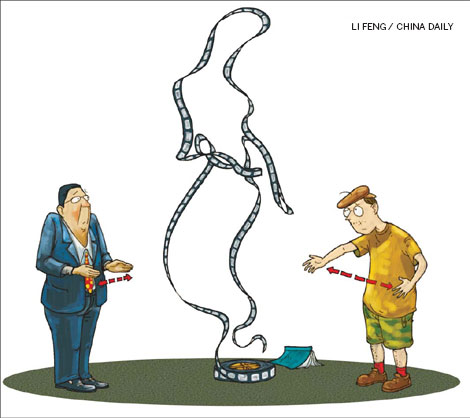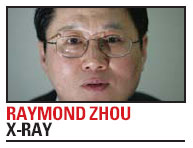View
Cut down to size
Updated: 2011-06-24 07:52
By Raymond Zhou (China Daily)

A spat over an extended excision of a soon-to-be-released film illustrates the power struggle inside China's booming film industry and the difficulties of power sharing.
People take their films to festivals for exposure. Eyebrows were raised when whoever was responsible for Rest on Your Shoulder did everything they could to prevent the media and regular audiences from watching their movie at the just concluded 14th Shanghai International Film Festival (SIFF). First, the director Jacob Cheung was a no-show. Then, unlike the other two Chinese entries for the Golden Goblet Award, this one played only once, and at a very small theater. As if that was not enough, members of the press who waited outside were denied entry to fill up the empty seats, as is the norm.
Rumors started flying. The fantasy film about a woman turning into a butterfly had been trimmed from its original length of two hours to an hour and a half - by none other than the distributor. The fewer the people who watched the full version, so went the rationale, the less the cut would be criticized.
As a result, the select few who got to watch the full version, such as Barry Levinson, president of the Golden Goblet jury, bragged they saw the "extended cut" which, by the way, did not win any award.
Coincidentally, one of the movies screened at SIFF was Fritz Lang's masterpiece Metropolis, which had large parts truncated right after its 1927 premiere in Berlin. For decades, this sci-fi pioneer was shown in versions that ran for around 90 minutes. It took a team of dedicated archivists and film historians a long time to assemble the almost-complete version I saw in Shanghai.
It was made up of three distinct parts: some two hours of footage that had been restored and cleaned up by 2002, over 20 minutes of lost scenes recovered in 2008 in Argentina that still have lots of scratches, and a couple of still unaccounted-for scenes that had been replaced with verbal descriptions.
I'm not suggesting Rest on Your Shoulder is as important as Metropolis. There is little likelihood of that. But the tug-of-war between art and commerce has just seen a new manifestation. Wang Quan'an, a Chinese director also on the jury panel for the Golden Goblet, when asked at a forum about censorship, replied: "It is a reality we have to live with, but Western filmmakers have to deal with producers and distributors, who sometimes impose constraints that are much harsher than what censors do."
Now, the westerly wind has blown east.

Filmmakers, by nature, operate under constraints. Unlike poets, they utilize resources that mostly belong to others. Unless one spends exclusively one's own money, there is a responsibility to the investors. But that point is often lost in China because the film director is perceived as an omniscient and omnipotent god in film production.
Left on their own, many will turn artistic visions into artistic indulgences. Some directors routinely produce original cuts that run six hours or longer, such as the 1963 version of Cleopatra. They just cannot part with anything they have poured their heart and soul into, which is understandable. But the audience, not having invested this level of emotion in a film, may care less about the hardship or even technical brilliance of a production. They just crave a good yarn.
A documentary about the decay of the rust belt in China's Northeast, Tiexi District, runs for a whopping nine hours. While socially significant, the film is virtually unplayable in theaters. It resembles a spool of unedited footage with interest only to sociologists - and maybe a handful of cineastes. While one can debate its artistic merits, there is no doubt this film does not have any commercial viability.
However, films are not regular products, either. They do possess artistic attributes, which should be respected. Stories need a certain length and pacing to be fleshed out. Not all film tales can be told in 90 minutes. The conflict between art and business is a perennial topic, and one that a forum at SIFF, of which I was a moderator, attempted to address. Directors Bille August and Hugh Hudson, respectively of Pelle the Conqueror and Chariots of Fire, both Oscar-winning films, insisted at the forum that the director and the producer should share one vision. Only then can they find common ground for differences.
But in China, there is an acute shortage of competent film producers - people with intimate knowledge of both the artistic and business aspects of filmmaking. In the West, directors are often hired guns while in China filmmaking is very much director oriented. All film directors are essentially co-producers, a situation that August and Hudson deemed less than ideal.
They believe power should be decentralized even though that gives the director less clout. They see the sharing of power as a fact of life rather than an anomaly. But this notion is somewhat foreign here. I can safely say China has more directors with rights to final cut than Hollywood has had throughout the ages combined.
There is also a distinction between big-budget films and small independent art-house flicks. For the former, the director yields more artistic control in return for the chance to work in a big production and make more money. But for the latter, he or she retains a greater hold because the financial risk is considerably less for the investor. Generally speaking, the higher the budget, the less the director holds sway.
Nowadays DVDs offer a compromise when it comes to the way a finished film is presented. A much-longer director's cut can be preserved on the disk while a theater can squeeze more showings from a shorter version. As a matter of fact, for a hit it enhances the sale of the DVD when it includes something new.
But back to the controversy surrounding Rest on Your Shoulder. I talked to Gao Jun, the distributor of this film who has received a lot of criticism for "over-stepping" and "butchering" the film. Here is what he told me: The investor is totally new to the business, which means he does not have much bargaining power. Yet he has put in some 60 million yuan ($9.27 million) into the project, a very risky move. Gao agreed to take on distribution on condition that it be shortened. "It was a beautiful movie. What I wanted was to turn a plump beauty into a slender one."
Gao did not admit he had it pared down, "at the hands of the country's best film editor", for commercial reasons. "The pacing was too leisurely and needed to be tightened," he insisted.
The director has resorted to SARFT, the government regulator, for arbitration since the shortened version needs a separate license for public screening. Now, even the investor, who first sided with the distributor, has relented and will show only the director-endorsed version.
"I have three choices: I can refuse to distribute it; I can go ahead and distribute the longer version but set the condition I do not take any financial risks; and I can privately show the 93-minute version to a circle of critics so that it can get a fair review," Gao told me.
I agree that only those who watch both versions are in a position to comment on the merits or drawbacks of the unofficial tightening. Artists like their female stars to be svelte, but their movies to be corpulent. That is dictated by the length-is-a-sign-of-substance school of award decisions. Above all, Chinese filmmakers should realize that making movies involves a sort of Faustian pact: One cannot expect to have the best of both worlds of money and art. Like politics and other things, it is in the trade-off that the art of filmmaking lies.
E-paper

Franchise heat
Foreign companies see huge opportunities for business
Stitched up for success
The king's speech
Tough sail
Specials

Premier Wen's European Visit
Premier Wen visits Hungary, Britain and Germany June 24-28.

My China story
Foreign readers are invited to share your China stories.

Singing up a revolution
Welshman makes a good living with songs that recall the fervor of China's New Beginning.
